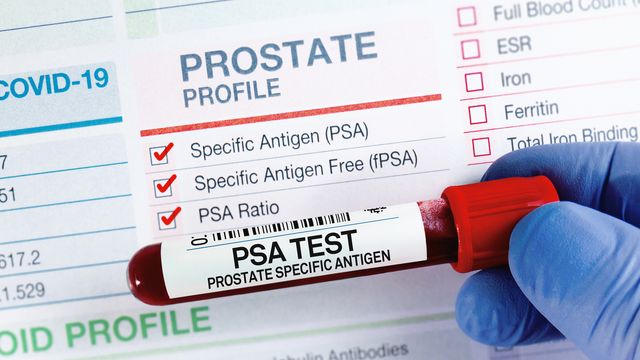Thank you. Listen to this article using the player above. ✖
The multi-arm, multi-stage prostate cancer clinical trial, STAMPEDE, has evaluated the clinical benefits of adding various drugs to the standard of care treatment for men with newly diagnosed metastatic prostate cancer.
One of the trials within this platform tested whether the diabetes drug metformin could improve survival and/or reduce the severity of common and unpleasant side effects associated with treatment.
Results published in Lancet Oncology show that metformin significantly decreases the metabolic side effects associated with standard of care prostate cancer therapy. The Phase III trial was co-led by Professor Noel W. Clarke (The Christie NHS Foundation Trust) and Professor Silke Gillessen (Oncology Institute of Southern Switzerland).
Prostate cancer standard of care drives major side effects
The standard of care for advanced metastatic prostate cancer is lifelong androgen deprivation therapy (ADT), with or without radiation therapy and other systemic treatments. ADT is a type of hormone therapy that lowers testosterone levels, and since most prostate cancer cells rely on testosterone to grow, lowering testosterone can slow cancer progression.
However, ADT can also drive metabolic side effects, including increased fat mass and weight, decreased insulin sensitivity and altered lipid profiles. These issues can lead to metabolic syndrome, a cluster of conditions that raise the risk of heart disease and type 2 diabetes.
Prior small-scale trials have hinted that metformin has anticancer properties, for example by improving castration-resistant prostate cancer-free survival. Furthermore, epidemiological evidence suggests that metformin use can reduce cancer risk and cancer deaths among people with diabetes. Metformin was therefore included as an arm of the STAMPEDE study due to its demonstrated anticancer activity in several malignancies, including prostate cancer, and to evaluate its potential in mitigating the metabolic side effects associated with ADT.
Metformin mitigates metabolic effects of hormone therapy
Between 2016 and 2023, 1,874 patients with metastatic prostate cancer were randomly assigned either:
- Standard of care treatment, or
- Standard of care plus metformin
Most participants had synchronous metastatic disease, where metastases are diagnosed at the same time as the primary tumor, while a small subset (6%) had metachronous relapsing disease, where metastases developed after initial treatment for localized prostate cancer. Standard of care was long-term ADT for all patients, with additional treatments including radiation therapy, docetaxel or androgen receptor pathway inhibitors.
The key findings of the paper were:
- Patients receiving metformin gained only 2 kg, compared to 4.4 kg gained by the control group.
- Total cholesterol, blood sugar and waist measurements were all significantly lower in the metformin group.
- Fewer patients reported signs of metabolic syndrome.
- Metformin was generally well tolerated, with diarrhea being the most common side effect.
- There was no significant evidence of an overall survival benefit of adding metformin to standard of care in the overall population of patients. However, there was some indication of potential oncological benefit observed in patients with high-volume disease.
Improving quality of life and possible benefits in high-volume disease
Morphometric and metabolic outcomes from metformin use in the STAMPEDE trial showed that it does significantly reduce the adverse metabolic side effects associated with ADT use.
While metformin didn’t show significant overall survival benefits, the study also found evidence that metformin may have a greater benefit for patients with high-volume disease, where the cancer has spread more extensively through the body. In the high-volume disease subgroup, there was a 10-month improvement in overall survival with the addition of metformin. However, the study was not sufficiently powered to draw conclusions between disease subgroups.
One of the proposed mechanisms by which metformin confers anticancer properties is by activation of adenosine monophosphate-activated protein kinase (AMPK), a key regulator of cellular energy use. AMPK activation results in mammalian target of rapamycin (mTOR) inhibition, leading to reduced cell growth, proliferation and metabolic activity – all processes necessary for cancer development and progression.
Together, data from this trial suggest potential for a personalized treatment approach, where patients with higher disease burden may benefit most from metformin. Moreover, the results underscore the broader therapeutic potential of metabolically targeted agents in this disease setting.
For many people with prostate cancer, ADT is a long-term or even lifelong treatment. Therefore, even moderate improvements in side-effect profiles can significantly improve quality of life. By reducing the risk of metabolic syndrome, metformin may also lower the need for additional interventions such as diabetes or heart disease management, lessening healthcare system burdens.
Crucially, metformin is well tolerated and inexpensive, making it an accessible addition to standard of care treatment to reduce side effects and improve quality of life in patients.
It should be noted that the population of patients in the study was a limitation, with most patients having synchronous disease, making extrapolation of data to metachronous disease difficult. Additionally, the trial was open-label rather than blinded, although survival outcomes and metabolic parameters are unlikely to be affected by clinicians’ or patients’ knowledge of metformin use.
Identifying patient subsets for metformin-based cancer therapy
Future work will be necessary to elucidate the potential anticancer effects observed in patients with high-volume disease fully and determine exactly which subset of patients metformin could benefit. This objective aligns closely with the aims of the translational program associated with the metformin trial, currently being conducted through the University of Manchester.
Reference: Gillessen S, Murphy L, James ND, et al. Metformin for patients with metastatic prostate cancer starting androgen deprivation therapy: a randomized phase 3 trial of the STAMPEDE platform protocol. Lancet Oncol. 2025;26(8):1018-1030. doi:10.1016/S1470-2045(25)00231-1
